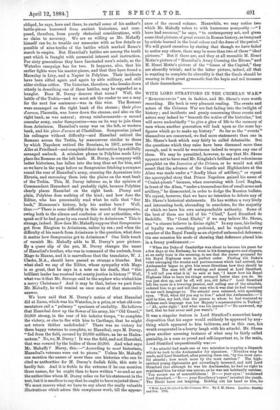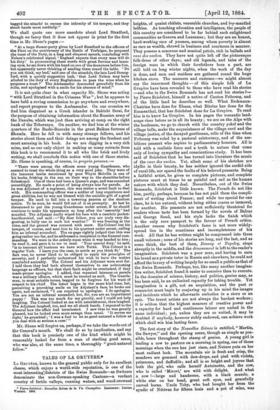WITH LORD STRATFORD IN THE CRIMEAN WAR:o " REMINISCENCES "
are in fashion, and Mr. Skene's were worth recording. His book is very pleasant reading. The events and
actors of the Crimean War are fast fading into the twilight of history ; and incidents and gossip concerning those events and actors may indeed be "beneath the notice of the historian," but will serve undoubtedly "to give a glow of life to the memory of men whom another generation will look upon as the mere lay- figures which go to make up history." So far as the " events " themselves are concerned, we find more statements than one in Mr. Skene's book which may fairly be called debateable. But the questions which they raise have been discussed more than enough, and it would be wearisome indeed to reopen any one of them. We may be permitted, however, to say that Mr. Skene appears not to have read Mr. Kinglake's brilliant and voluminous pamphlet on the Invasion of the Crimea, or he would not still assert that the advance of the Guards and Highlanders it the Alma was made under a "deadly blaze of artillery," or repeat the apocryphal story that Prince Napoleon gained his name of " Craint-plomb " because, when conversing with Lord Raglan, in front of the Alma, "under a tremendous fire of small-arms and artillery," he dismounted, in order to dodge the Russian bullets. We repeat, however, that we have no intention to debate any of Mr. Skene's historical statements. He has written a very lively and interesting book, abounding in anecdotes, for the majority. of which we have his own unimpeachable authority. Some of the best of them are told of his "Chief," Lord Stratford de Redcliffe. The "Great Eltchi," if we may believe Mr. Skene, was "a sincere believer in divine right." In any case, his feeling of loyalty was something profound, and he regarded every member of the Royal Family as an object of unbounded deference.
On one occasion his mode of showing that deference placed him in a funny predicament :—
"When the Duke of Cambridge was about to become his guest for a few days at the Embassy, he went in his dressing-gown and slippers, at an early hour in the morning, to see that the rooms prepared for his Royal Highness were in perfect order. Finding the Duke's valet arranging the trunks and portmanteaus which had arrived, the Ambassador began to give him some directions how they should be placed. The man left off working, and stared at Lord Stratford. I will tell you what it is,' he said at last, I know bow his Hoye/ Highneis likes to have his things arranged better than you do. So you just shut up, and be off, will you, old feller ?' Lord Stratford left the room in a towering passion, and calling one of the attaches, ordered him to go and tell that man who it was that he had ventured to use such language to. The attache soon returned, with sparkling eyes. Well, what did you say to him ?' asked the Ambassador.—'.I said to him, my lord, that the person to whom he had ventured to address such language was her Majesty's representative in Turkey.' —` Ah, quite right ! And what was his answer ?'—' He answered, my lord, that he had never said you warn't.' " It was a singular feature in Lord Stratford's somewhat hasty disposition that his anger would suddenly be appeased by any- thing which appeared to him ludicrous, and in this case, his wrath evaporated in a hearty laugh with his attaché. Mr. nem gives another amusing instance of what may be fairly called
geniality, in a man so proud and self-important as, in the main, Lord Stratford unquestionably was :—
" An attache had made one or two mistakes in copying a dispatch which he took to the Ambassador for signature. Mistakes may be made, said Lord Stratford, after pointing them out, 'by the most care- ful attaché ; how much more by the most careless !' The high- spirited yoang diplomatist got exceedingly incensed, and told Lord Stratford that although he was his Ambassador, he had no right to reprimand him for what was untrue, as he was not habitually careless. You accuse me of untruthfulness ! D— your eyes ! ' exclaimed Lord Stratford.—'D— your Excellency's eyes !' retorted the youth. The Eltchi burst out laughing. Holding out his hand to him, he • With Lord Stratford in the Crimean War. By I. H. Shone. London : Bentley and Son. 1583.
begged the attaché to excuse the infirmity of his temper, and they shook hands most cordially."
We shall quote one more anecdote about Lord Stratford, though we fancy that it does not appear in print for the first time in Mr. Skene's pages :—
" At a large dinner-party given by Lord Stratford to the officers of the Fleet on the anniversary of the Battle of Trafalgar, he proposed The toast of the Navy, in a long and eloquent speech, concluding with Nelson's celebrated signal, England expects that every man will do his duty.' In pronouncing these words with great fervour and beam- ing eyes, he sat down with his hand on one of the decanters before him, but apparently never thinking of sending them round the table. 'Do you not think, my lord,' said one of the attaches, the late Lord Strang- ford, with a quietly suggestive look, that Lord Nelson may have alluded to the duty of every Englishman to pass the wine when he 'proposes a toast P' The Ambassador descended gracefully from his stilts, and apologised with a smile for his absence of mind."
It is not quite clear in what capacity Mr. Skene was acting "with Lord Stratford in the Crimean War " ; but he appears to have held a roving commission to go anywhere and everywhere, and report progress to the Ambassador. On one occasion we find him disguised as a Greek islander in Baktchi Serai, for the purpose of obtaining information about the Russian army of the Danube, which was just then arriving at camp on the right bank of the Tchernaya. On another, we find him at the winter quarters of the Bashi-Bazouks in the great Balkan fortress of Shumla. Here he fell in with many strange fellows, and his stories about them and their doings are among the freshest and -most amusing in his book. As we are digging in a very rich mine, and as our only object in making so many extracts from this book is to recommend it to all who like brisk and lively writing, we shall conclude this notice with one of those stories. Mr. Skene is speaking, of course, in propria persona:— " There were among the officers some young Guardsmen, who seemed to treat the whole thing as a very good joke. They were of the innocent lambs mentioned by poor Whyte Melville in one of his books, frisking in the sun on their way to the shambles before Sebastopol. One of them had been a Queen's page, and was conceited accordingly. He made a point of being always late for parade. As he was Adjutant of a regiment, this was rather a novel fault to deal with. His commanding officer was a soldier of long experience and great abilities, but he was not blessed with the amiable gift of a good temper. He used to fall into a towering passion at the shortest notice. To be sure, he would fall out of it us promptly. At last he Threatened to put the young Guardsman under arrest, if be should continue to make his appearance so long after the 'assembly' had sounded. The Adjutant coolly wiped his face with a cambric pocket- handkerchief, and said t--' My dear fellow, you are truly very dis- gusting, to bully one in such hot weather !' It was freezing at the time, and the ground was covered with snow. His Colonel lost his temper, of course, and sent him to his quarters under arrest, calling him an infernal scoundrel. The ex-page rightly judged that this was going rather too far, and he addressed a complaint to the General com- manding. We were in the orderly-room when it was handed to him ; he read it, and gave it to me to read. Your special duty,' he said, is to transact all business we have with Turks. This Colonel is a regular Turk. I leave you the case, to settle as you think fit! The fact was, he never liked to be obliged to apply his principles of -severity, and I perfectly understood his wish to have the matter concluded amicably. The Colonel and his Adjutant were sent for. I told them they had both allowed themselves to use unbecoming language as officers, but that their fault might be overlooked, if they made proper apologies. I added, that repeated lateness on parade was a military offence, which must be treated as such. The Guards- man, in most suitable terms, begged to be forgiven for his want of respect to his chief. The latter began in the same kind tone, but, perceiving a provoking smile on his Adjutant's face, he broke out -again, and exclaimed, "I am required to apologise. I do apologise. You are not an infernal scoundrel, but, Sir, you are an impertinent puppy !' This was too much for my gravity, and I could not help laughing. The Colonel looked at me with astonishment, then laughed. The Adjutant laughed, too, and we all shook hands. I repeated to the General how the affair had terminated. I saw that he was greatly pleased, but he looked even more savage than usual. It serves me right,' he grumbled ; 'I was a fool to let so good-natured a fellow as you deal with so serious a case.'"
Mr. Skene will forgive us, perhaps, if we take the words out of the General's mouth. We shall do so by implication, and say that this book is precisely one of the kind which might be reasonably looked for from a man of sterling good sense, who was also, at the same time, a thoroughly "good-natured fellow."



































 Previous page
Previous page